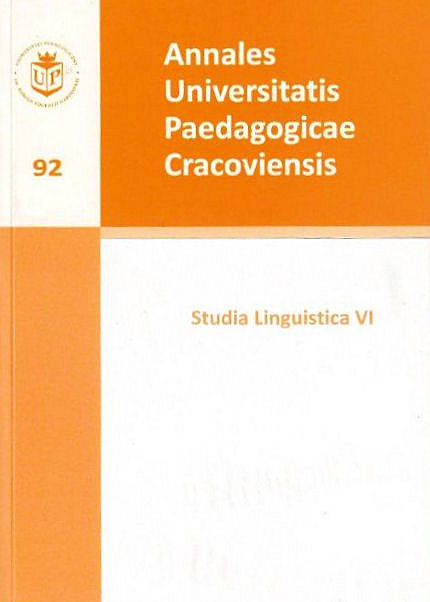Językowo-kulturowo-symboliczna zaduma nad północnokresowym kultem zmarłych utrwalonym w badaniach polskich uczonych różnych pokoleń
Main Article Content
Abstrakt
The paper contains philological reflections on the cult of the dead in northeastern Borderlands. The cult has been a source of inspiration for interdisciplinary studies of many Polish scholars - the popularizers of Polish culture, tradition and folklore. The analysis of the excerpts of the works of Oskar Kolberg, Aleksander Brückner, Aleksander Lubicz, Zenon Sobierajski, Czesław Pietkiewicz, Barbara Ogrodowska, Hanna Żyburtowicz and Teresa Kokocińska, the authors of Encyklopedia Kresów, as well as of Piotr Grochowski, allows the author to emphasize the uniqueness of: a) Radunica (celebrated in the time of Easter and Whitsunday) and b) Dziady (celebrated at end of October or at the beginning of November at the time of Christmas and Shrovetide). Językowo-kulturowo-symboliczna zaduma nad północnokresowym kultem... [207] The early Slavic pagan elements of these holidays are still present in Easter and Christmas customs. The names of the objects used in rites in northeastern cemeteries, churches and houses have been interpreted in terms of language forms and symbolism. Amongst the objects, most significant are: egg, knish (a baked or fried dumpling made of flaky dough with filling), kutia (a sweet dish usually made of wheat grain, poppy seeds and honey), kisiel owsiany (oat gelatin dessert), fish, groats, pea, broad been, bread, cheese, salt, honey, poppy seeds, dried mushrooms, white tablecloth, fire, open window and door, spoon and figures of forefathers-beggars. A comprehensive analysis of the names allows the author to interpret the cult as a form of peculiar dialogue between sacrum and profanum, paganism and Christianity, the past and the present.
Downloads
Article Details
Autor, zgłaszając tekst do redakcji czasopisma „Annales Universitatis Paedagogicae Cracoviensis. Studia Linguistica”, zaświadcza, iż jest on rezultatem wyłącznie jego własnej twórczości, że treść artykułu nie była dotychczas publikowana oraz że utwór nie narusza w żadnym stopniu praw autorskich ani praw pokrewnych innych osób, jak również innych praw osób trzecich, a także, że niczyje prawa do utworu (lub jego jakiejkolwiek części) nie zostały pominięte. Po podpisaniu umowy prawa majątkowe do opublikowanych materiałów zostają przeniesione na Wydawnictwo Naukowe Uniwersytetu Komisji Edukacji Narodowej w Krakowie.
Rocznik „Annales Universitatis Paedagogicae Cracoviensis. Studia Linguistica” to czasopismo o otwartym dostępie, a cała jego zawartość jest udostępniana bezpłatnie dla użytkowników i instytucji na zasadach licencji Creative Commons CC-BY-NC-ND 4.0 (uznanie autorstwa, użycie niekomercyjne, bez utworów zależnych). Na podstawie tej licencji autorzy zgadzają się, że ich prace mogą być zgodnie z prawem ponownie wykorzystywane do jakichkolwiek celów, za wyjątkiem celów komercyjnych, bez konieczności uzyskania uprzedniej zgody ze strony autora lub wydawcy. Każdy może prace te czytać, pobierać, kopiować, drukować, rozpowszechniać oraz przetwarzać, pod warunkiem poprawnego oznaczenia autorstwa oraz oryginalnego miejsca publikacji. Publikowanych tekstów nie można wykorzystywać do tworzenia utworów zależnych (np. do tłumaczenia ich i publikowania w innym języku bez zgody wydawcy). Jest to zgodne z definicją otwartego dostępu BOAI (Budapest Open Access Initiative) „Studia Linguistica”nie pobiera opłat za składanie artykułów ani ich przetwarzanie.
Autor, przesyłając artykuł do redakcji „Studia Linguistica”, bezwględnie zgadza się z poniższymi punktami:
-
Oświadczam, że jestem Autorem lub Współautorem nadesłanego tekstu. Przesłany tekst nie był nigdzie publikowany, jest całkowicie oryginalny i nie narusza w żadnym stopniu praw autorskich ani praw pokrewnych innych osób, jak również innych praw osób trzecich, a także, że niczyje prawa do utwory nie zostały pominięte.
-
Oświadczam, że nadesłany tekst nie został złożony do recenzji lub/i publikacji w innym czasopiśmie.
-
Przyjmuję do wiadomości, że Autor ponosi pełną odpowiedzialność za każdy przypadek plagiatu, niezależnie od tego, czy został on wykryty podczas procesu recenzji, czy po publikacji w „Studia Linguistica”.
-
Oświadczam, że ponoszę pełną odpowiedzialność finansową i prawną za wszelkie roszczenia związane z utworem.
-
Potwierdzam uznanie wszystkich źródeł danych wykorzystanych i cytowanych w badaniach.
-
Potwierdzam, że artykuł został wykonany z należytą starannością zgodnie ze standardami edytorskimi „Studia Linguistica”.

